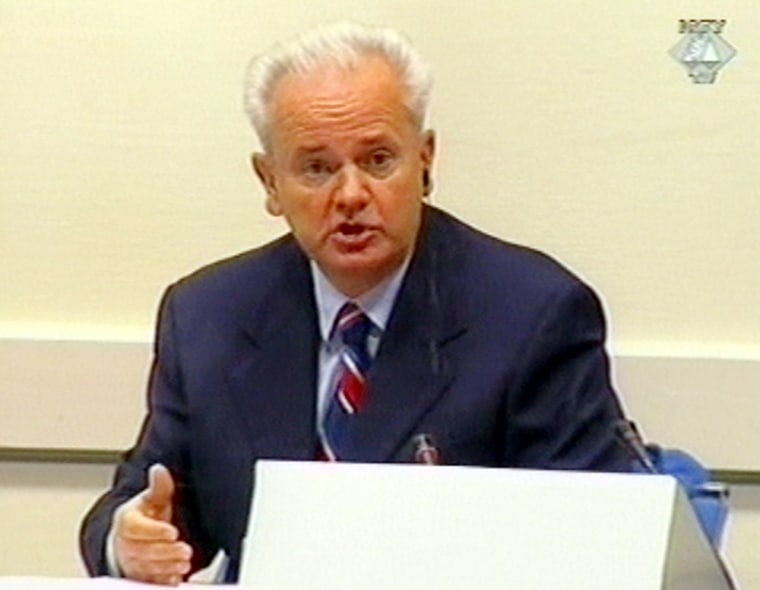The U.N. war crimes tribunal ruled Thursday it will impose a defense lawyer on Slobodan Milosevic, whose doctors say his heart condition could become life threatening if he continues to represent himself.
The court did not immediately name the attorney who will act as defense counsel for the former Yugoslav president, nor say when he would be assigned.
Milosevic, 63, who has used the 2½-year trial as a platform for his political views, has refused to accept a lawyer who would replace him in examining witnesses.
“It is plain from the medical reports that the accused is not fit enough to defend himself,” said presiding judge Patrick Robinson.
Milosevic protested the decision and said he would appeal.
“Mr. Robinson, I told you yesterday already that I did believe, and I believe now, that the assignment of counsel directly violates my fundamental rights. Please give me answers in relation to that belief of mine,” he said, seated alone at the defendant’s table.
He called the decision “a violation of international law, every conceivable covenant on human rights,” adding that it was “a scandal. You cannot deny me the right to defend myself.”
Robinson cut off Milosevic’s microphone and said the judges had extensively considered their decision, which was final.
New medical tests denied
By a vote of 2-1, the court also rejected Milosevic’s request on Wednesday for a new round of medical tests by independent doctors. Robinson dissented, saying the issue was too important to be left in any doubt.
Robinson said two court-assigned doctors who examined Milosevic concluded that he suffers “severe essential hypertension” and that continuing to represent himself could lead to “a potentially life threatening situation.”
They said that by allowing him to continue representing himself “there is a real danger that this trial might last an unreasonably long time,” Robinson said.
Assigning a defense lawyer “is in the interests of justice. We will, therefore, do so,” he said.
The judges recognized the right of a defendant to represent himself, but cited his lengthy periods of illness in saying that right “is not unfettered.”
Milosevic’s bouts of fatigue and high blood pressure already have forced the suspension of hearings more than a dozen times and the loss of 66 trial days since the case went to court in February 2002.
After wrapping up the opening statement of his defense case Wednesday, Milosevic sparred with prosecutors who cited medical reports from last week that he was refusing to take prescribed medication.
Prosecutors Geoffrey Nice said Milosevic “is manipulating this tribunal” with his health problems, and urged the court to assign him a lawyer who could continue the defense when Milosevic is too ill to attend sessions.
“This is highly improper,” Milosevic responded. “You do not take away somebody’s right to self defense when he is sick.”
He said the medication prescribed by doctors at the U.N. detention center made him too drowsy to work on his case, and he was taking other medication on the advice of his cardiologist from Belgrade who had been treating him for 10 years.
Bosnian Serb leader acquitted of genocide
Also Wednesday, another three-judge bench of the International Criminal Tribunal for the former Yugoslavia acquitted a Bosnian Serb leader of genocide, but convicted him of eight other charges.
The verdict in the five-year trial of Radislav Brdjanin, wartime leader of the autonomous Krajina region of Bosnia, should encourage Milosevic, who also faces charges of genocide among more than 60 counts of war crimes.
Brdjanin, 56, a powerful Serb figure at the start of the Bosnian war in 1992, was convicted on eight of 12 charges and sentenced to 32 years imprisonment — a surprisingly lengthy term in view of the acquittals on the most serious charges related to genocide and extermination.
Despite a Serb campaign of mass murder, torture and deportations of non-Serbs, the court said the brutality fell short of genocide, which requires stringent proof the sole intent was to wipe out the Muslim and Croat communities.
The acquittal was a setback for prosecutors who placed genocide at the center of Milosevic’s indictment. He is accused of responsibility for the deaths of more than 7,500 Bosnian Muslim men and boys in the U.N.-protected enclave of Srebrenica in 1995.
The tribunal has set a high bar for a genocide conviction. Of more than a dozen Serbs charged with genocide, only one, Gen. Radislav Krstic, has been convicted — and the charge was reduced on appeal to aiding and abetting genocide.
